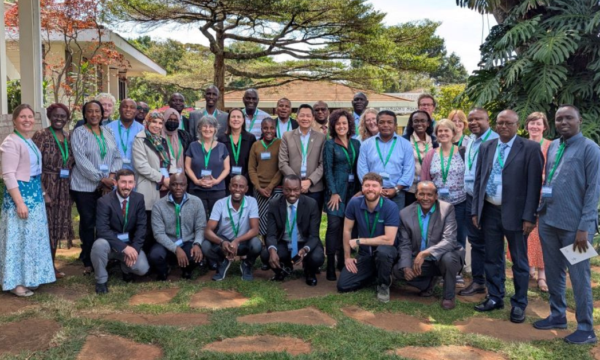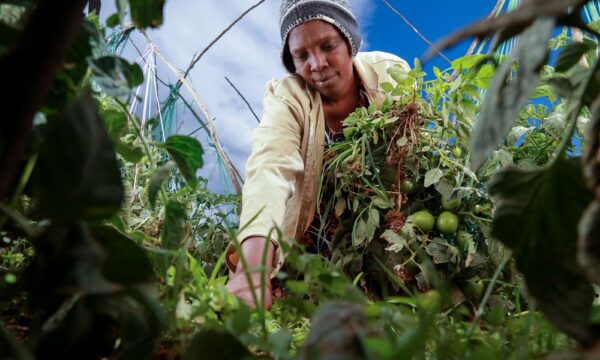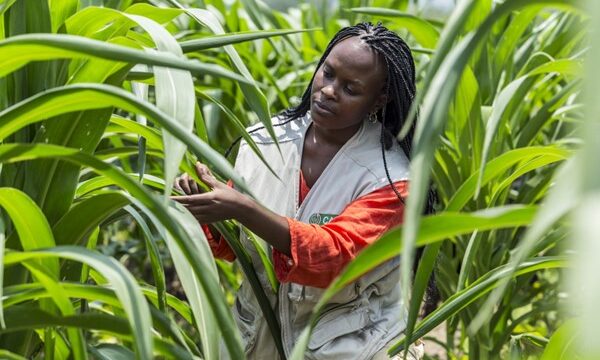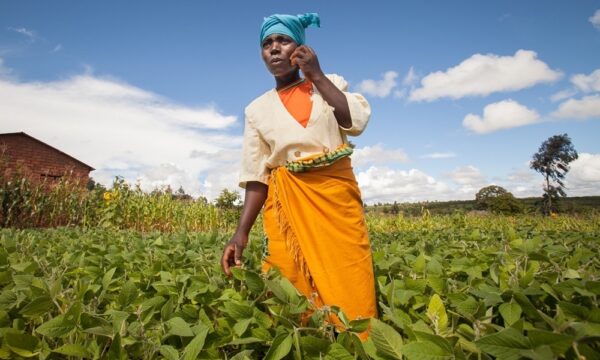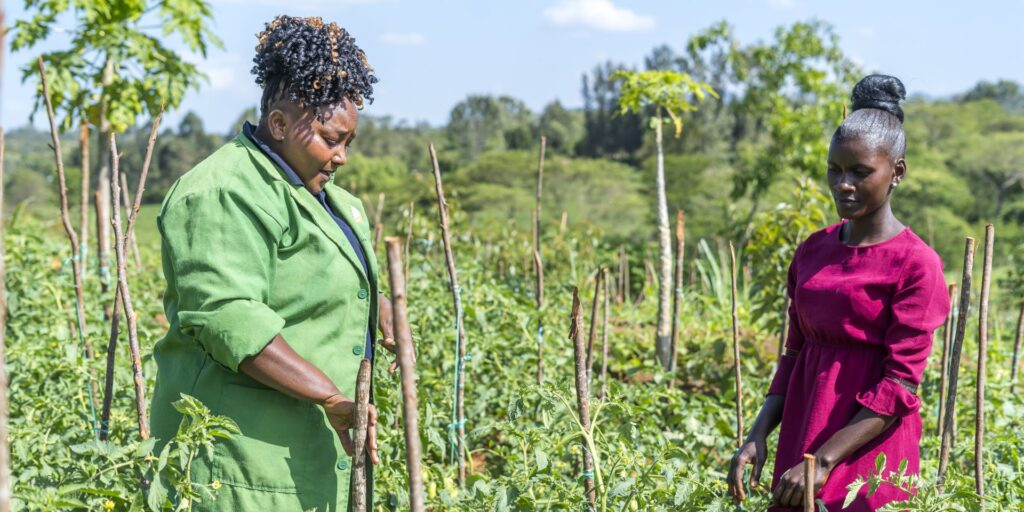
While working with women farmers across Africa for the past 17 years, Dr Lora Forsythe, lead of the Gender and Social Difference research group at the Natural Resources Institute, University of Greenwich in the United Kingdom, heard a common refrain
“Many different women in diverse contexts told me they struggled with poor soil,” Dr Forsythe recalled. “I’d heard about this for years, and it got me wondering. Were there intersectional gender differences in experiences and knowledges relating to soil? Was this because women and minoritized groups are more likely to access land with poorer soil or was it related to agricultural practices? What was the broader political ecological context influencing these relations? I knew we needed to focus on this.”
She approached her colleague, Dr Lucie Büchi, a senior lecturer in crop ecology at the University of Greenwich, who was intrigued by the questions. “I’d never really thought about it,” Dr Büchi said, “but it makes sense.”
As Dr Büchi and Dr Forsythe discussed their idea with other scientists, they were pleased to find enthusiasm for expanding the study of soil beyond its usual technical approaches to also focus on social relations and power, which are overlooked aspects of soil health and gender equity. Buoyed by the response, they developed an interdisciplinary research proposal that found support from the Juno Evidence Alliance.
“Innovative research that challenges existing norms in agriculture and provides the scientific evidence to begin establishing new norms is exactly the type of work that we support,” said Juno Director, Professor Jaron Porciello, who also serves as Global Director for Evidence and Policy at CABI.
Rethinking leadership and capacity in agrifood systems
Juno is also supporting pioneering research that is examining the definitions of management and leadership in relationship to capacity development in African agrifood systems. Both efforts are using evidence synthesis in a bid to address barriers to gender equity and women’s empowerment by challenging existing paradigms—the dominant standards, perspectives, theories and research methods that influence our behaviors, beliefs and understanding of the world.
Evidence synthesis is a research method bringing together all relevant studies on a given question to summarize what is known and what remains uncertain about a given topic. This method uses systematic processes to identify relevant evidence and synthesizes the data to create ‘systematic reviews’ on a topic.
Researchers from Cornell University taking part in the gender review for Juno hope their findings ultimately will help inform the design and development of agricultural interventions and programs that truly meet the needs of their beneficiaries.
“Although donors, governments and research organizations are increasingly focused on localized interventions, they often remain framed within a Western context, making them less applicable,” explained Dr Ida Arff Tarjem, a postdoctoral fellow at Cornell University’s School of Integrative Plant Science who is working on the leadership analysis.
For example, though leadership definitions and practices are highly dependent on context, capacity building policies and programs tend to reflect and reinforce management and leadership structures and values that are Western, economic and male-dominated, Dr Tarjem noted. “The ‘modern’ concept of management has strong ties to colonialism in Africa and slavery in the United States, among others.
“Few people are questioning the fundamental concepts on which leadership and management capacity development in the context of agrifood systems are based,” she continued. “That’s what makes this review so important. We want to bring in a fresh perspective and view these established concepts through a critical lens.”
The two analyses represent a major shift for agriculture, which has typically been discussed in the context of production and economics. But Dr Büchi believes that particular paradigm is already changing, noting that London was hosting a landmark exhibit that presented soil as a living entity, with contributions from artists, writers and scientists.
Challenging global narratives in gender and agriculture
Both teams are looking to identify research gaps and existing stereotypes about women in agriculture, including the current assumption that only women in the Global South face barriers in the global agrifood system.
“Ultimately, we would like to point to key aspects that would guide future critical research,” Dr Forsythe said. “A lot of the gender and agriculture research focuses on the micro level. But there are political drivers that cannot be ignored. The core of the review is these multi-scaled and interacting inequalities.”
Though earlier studies documenting the contributions of women’s labor in agriculture “opened doors for gender research in agriculture and agrifood systems, gender research is often still in the margins and there is disconnect with dominant global narratives relating to soil health,” Dr Forsythe added.
Dr Tarjem noted that leadership and agriculture are both influenced by strongly patriarchal, or male-dominated, norms, with masculine-coded qualities valued most highly. “That makes it harder for women to become leaders in the first place, and they are judged more harshly when they do,” she said. By failing to challenge these existing structures and norms, barriers to leadership tend be viewed as “women’s problems,” to be resolved simply by building their skills and confidence, when much more fundamental change is required.
Challenging existing norms to research
The teams are also hoping that their pioneering approach to research will inspire other scientists to question the standard approach to science and challenge existing norms. By documenting and sharing their process, they’re seeking to establish some navigational guideposts to smooth the way.
“The methodology of evidence synthesis is very Western, so we want to apply the critical lens to the methodology itself,” Dr Tarjem said. “We want to cast the glance inward and see how we can do evidence synthesis in a different way that can inform other evidence syntheses in the future. The current methodology tends to favor highly cited research published in English in peer-reviewed periodicals based in the Global North. But can we expand to look at other types of evidence? There’s so much evidence out there that’s not peer reviewed.”
“We can learn many lessons from practice, women’s collectives and community organizations that have been addressing these challenges under difficult conditions,” Dr Forsythe added.
Navigating the dynamics of power
The cross-disciplinary collaboration process has been eye-opening, in terms of observing the effects of specialization on knowledge production processes and the power and political dynamics that can arise “even with this little micro-operation we have,” Dr Forsythe said. “Interdisciplinary research is very interesting, but it requires a lot of work just to understand each other. But we’re both coming from a place of curiosity.”
Dr Büchi said the challenges are heightened by “the under-representation of women scientists in the field and in analyzing what’s going on.” The collaboration also has required “recognition of multi disciplines respecting different forms of evidence knowledge,” she said. “The politics of knowledge and gender sits in that firmly.”
Dr Tarjem agreed that the process “is super hard. We’re documenting all the challenges we’re trying to address, including the complexities and ethical tensions of our own positionality in being from the Global North, speaking largely about Global South contexts.”
Though their research approach and topics are pioneering, the three researchers are quick to acknowledge that they are not the first to conduct analyses through a feminist lens. “We’re standing on the shoulders of giants, drawing on seminal work by the Black, African, Indigenous and other feminist and critical scholars, who came before us,” Dr Tarjem said.
Additional information
The Juno Evidence Alliance is a global platform working to ensure better evidence drives better decisions across agriculture and food systems. Juno is co-founded by CABI and Havos.Ai, with support from UK International Development from the UK government and the Gates Foundation.
Main image: A Youth Service Provider from Makueni pictured with her mentee. Through its training and linkage programme, CABI equips young people to deliver agricultural services to cooperative members and associated businesses (credit: CABI)
Further reading
Advancing evidence-based research: Juno Evidence Alliance
Identifying future One Health research needs to benefit people, animals, plants and environment
Nepal scientists embrace the role of better evidence
Related News & Blogs
CABI and CRRI explore gender gap of crop loss impact at Odisha, India workshop
Why do men, women and youth experience crop loss differently? That question took centre stage at a stakeholder workshop in India, organized by the Central Rice Research Institute (CRRI) and CABI’s Global Burden of Crop Loss. Crop loss remains a pressin…
6 October 2025


